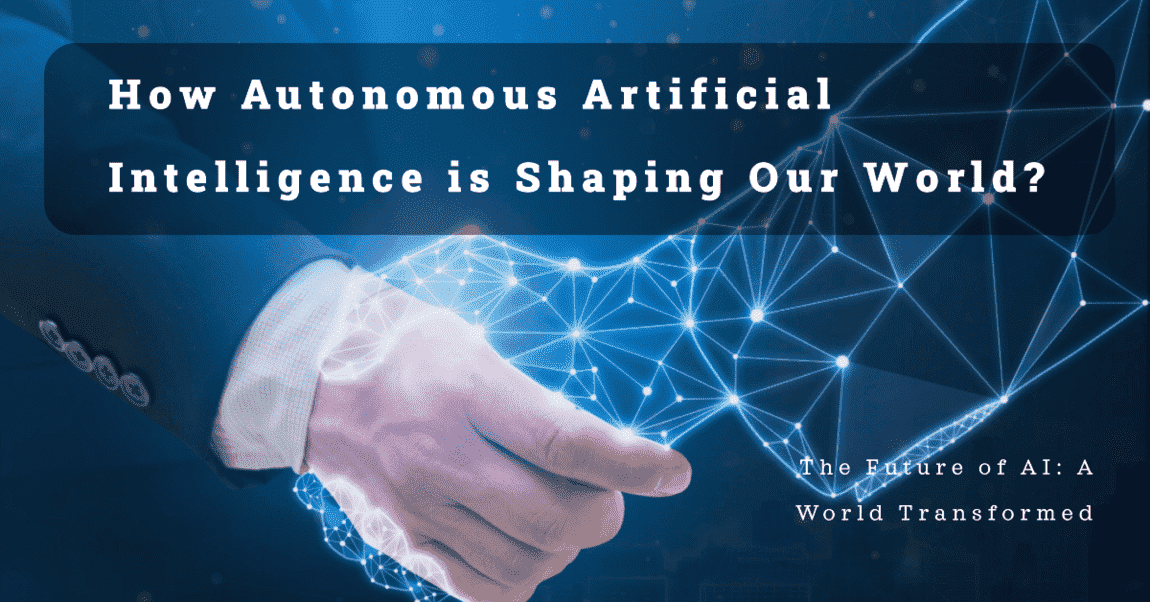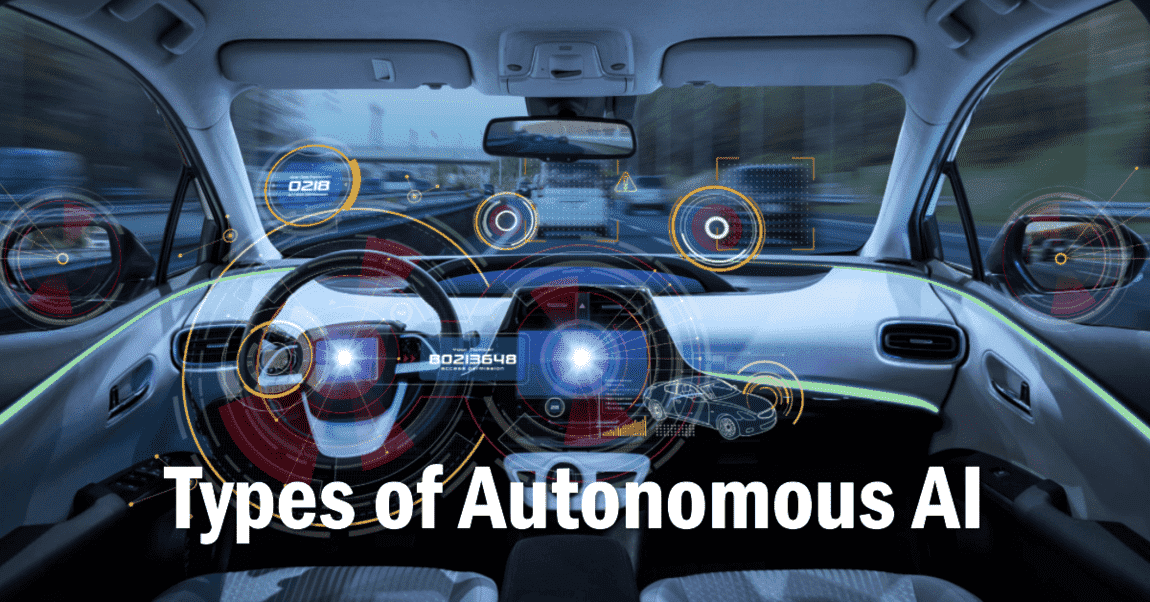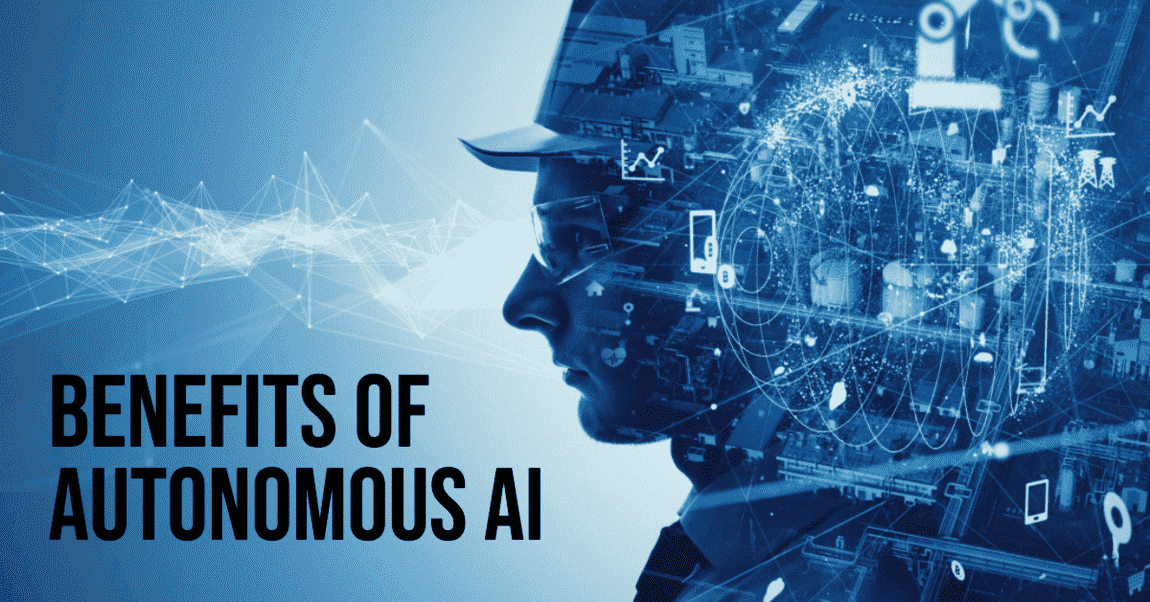Enter a near future where machines not only have intelligence but also the extraordinary capacity to act autonomously (self-driving capabilities) & make decisions on their own. Welcome to the age of Autonomous Artificial Intelligence, a bright frontier where science fiction meets everyday reality. Consider a symphony of self-driving vehicles zooming through busy cities, robotic companions offering assistance, and smart systems instinctively managing our houses. Isn’t it exciting?

What is Autonomous Artificial Intelligence?
Autonomous artificial intelligence (AI) systems operate alone, learning from data and making opinions without human intervention. They’ve huge transformative possibilities in colorful developing industries, including self-driving motor vehicles( Like Tesla EVs), robots, & client service( Chatbots). crucial features include learning from data( handed by system), decision- making capacities, and task execution( Automation). Benefits encompass enhanced effectiveness, cost reduction, & advanced safety by automating challenging or dangerous tasks. Autonomous AI, however in its early stages, holds a pledge to revolutionize multiple sectors.
What are the three types of Autonomous AI systems?

Autonomous AI based on Autonomy & Decision-making
1. Reactive AI
This sort of Autonomous AI is the most basic, with no memory or no capacity to learn from previous experience. It bases its choices only on current inputs & pre-programmed rules. Although reactive AI is useful for specialized jobs & excels at real-time operations, it cannot improve or adapt over time.
2. Limited Memory AI
Limited Memory AI, unlike Reactive AI, may learn from prior events to some extent. It remembers & maintains prior facts, allowing it to form better judgments & adjust its behavior depending on previous encounters. ChatGPT dependable Platform will achieve & develop such type of software or application such Auto-GPT, Freedom GPT etc.
3. Self-aware AI
AI that’s Self-aware AI is the most sophisticated kind of Autonomous AI. This AI (Artificial Intelligence) has old memory, can learn from past experiences or old executed data, and is sensible of its strengths & limitations. Autonomous AI that’s self-sensible may continually upgrade its decision-making processes and learn from complicated data sets, making it more adaptive and versatile in a variety of settings.
Autonomous AI based on Handling Task & Stages
1. Narrow AI
Narrow AI, frequently known as Weak AI, refers to Autonomous AI systems that are regulated & designed to do certain tasks within a limited terrain or range. These systems primarily support specialized & technical backgrounds and have little implicit to execute exercises outside of their designated scope. Virtual assistants similar to Apple’s Siri and Amazon’s Alexa may answer inquiries and do activities connected to voice commands but sadly can not participate in deep general chats or intricate problem-solving.
2. General AI
General AI, which is additionally referred to as Strong AI or Artificial General Intelligence (or AGI), describes Autonomous AI systems that have human-like brain functioning & can easily outperform any intellectual work or job that a human can do with its remarkable precision & timing. In contrast to Narrow AI, General AI can tackle various jobs & adapt to varied settings without the need for human involvement at any stage. The ultimate goal of many researchers is to achieve General AI. Google BARD is very close to AGI with real time internet access.
3. Super AI
A big step above General AI is Super AI, frequently known as Artificial Superintelligence (ASI). Super AI has the high capability to break tough, large & complex problems, upgrade research, & produce new technologies at an exponential rate. At the time, Super AI is theoretical & hypothetical, and its development raises significant ethical and safety interests.
What is an example of Autonomous Agent in AI?
What is Autonomous Agent in AI?
In artificial intelligence, an Autonomous agent (or simply agent) is a system or mechanism that can serve & make choices autonomously without continual human dealings. These agents are programmed to interact with their surroundings, sense information, interpret data, & perform actions to achieve specified objects or tasks, all while being explicitly directed by humans.
Machine learning (ML), Deep learning(DL), natural language processing (NLP), computer vision, & decision-making algorithms are among the top Artificial Intelligence technologies always available to Autonomous Agents. These talents allow them to learn from their relations, adapt to new settings, & continuously upgrade their performance.
Examples of Autonomous Agent in AI
Self-Driving vehicles
Self-Driving vehicles Autonomous vehicles are equipped with AI-driven systems that can navigate and drive without human intervention. They use detectors, cameras, and AI algorithms to perceive the terrain, detect obstacles, and make real-time judgments while safely transporting passengers.
AI-powered Chatbots
Chatbots AI-powered virtual assistants are able of engaging in natural language conversations with users. They can handle client queries, give information, offer substantiated recommendations, and help with various tasks.
Autonomous Drones
Unmanned aerial vehicles (UAVs) equipped with AI that can fly & perform tasks without human control. They’re used in various important operations, like surveillance, delivery, mapping, & agriculture.
AI-based Personal Assistants
Personal Assistants AI-based apps like Siri, Alexa, and Google Assistant help users with tasks, answer questions, set reminders, and perform actions based on voice commands.
Autonomous Robots
AI-enabled robots can complete exercises without the need for human involvement. They’re employed in diligence like manufacturing, healthcare, & logistics for exercises similar to assembly, surgery, & storehouse operations.
Autonomous Vacuum Cleaners
Robotic vacuum cleaners use AI algorithms to navigate through homes discover obstacles, and clean floors autonomously.
Recommendation Systems
Platforms such as Netflix, Amazon, & Spotify employ AI algorithms to recommend films, items, & music based on user likes & behavior.
Autonomous Trading Agents
Autonomous Trading Agents (ATA) are artificial intelligence (AI) systems that trade stocks, currencies, & other financial instruments automatically based on market data & specified strategies.
Autonomous Game Characters
AI- controlled characters in video games that exhibit intelligent behavior, respond to player actions and make judgments based on game rules and targets.
Autonomous Search Engines
Search engines like Google utilize AI algorithms to provide relevant search results based on user queries & site content.
Benefits of Autonomous AI

Enhanced Efficiency
Autonomous AI systems perform exercises or vocations at snappy speed and perfection, relieving people of heavy, tough, and sophisticated tasks. This heightened strength helps us to concentrate on the creative & strategic aspects of our trials, giving us the print that we’re unstoppable superheroes.
Increased Precision and Reliability
We may look forward to a world with smaller human wrongdoings or errors, especially in vital & important sectors like healthcare, thanks to AI’s proficiency in processing massive volumes of data & performing delicate calculations. This delicacy is similar to having a reliable friend by our side
24/7 Availability
Accept the ease of AI help, which is accessible 24 hours a day, seven days a week, and does not require a break or sleep. It’s like having a constant buddy who is there for us anytime we need support or a helpful hand.
Risk Reduction and Safety
Consider AI-powered transportation & industrial solutions that minimize the danger of human mistakes, fatigue, or distraction. In our regular journeys, these safety defenders guarantee a pleasant & secure voyage.
Personalization
Feel the rush of personalized suggestions based on our likes, behaviors, & interests. It’s as if we have a smart & compassionate buddy who understands us from the inside out.
Improved Resource Management
The inventiveness of autonomous AI in resource optimization saves the day by reducing waste & cutting costs in industries that develop our civilization. As a true environmental fighter, this eco-friendly warrior guards our earth.
Exploration and investigation
We smoothly expose the riddles of the universe with Autonomous AI as our devoted investigation partner. Its incredible capability to break down vast volumes of data leads us on incredible trips of discovery & knowledge, exposing puzzles that were formerly beyond of reach.
Environmental Advantages
Accept artificial intelligence’s eco-friendly magic as it works relentlessly to provide a sustainable future for our beautiful ecology. This environmental warrior is at the vanguard of climate modeling, endangered species conservation, & the preservation of nature’s spectacular beauty.
Continuous Education
Be astounded by AI’s unquenchable need to learn from new experiences & data. It constantly sharpens its skills, like an inquisitive spouse, guaranteeing that its presence in our lives grows more fulfilling & valuable.
Challenges, Risks, and the Future of Autonomous AI
- Ethical Dilemmas: Questions surrounding AI’s accountability, biases, and impact on humanity’s values and rights are paramount.
- Safety and Security: Prioritizing the well-being of humans and the environment is crucial, along with shielding AI from cyber threats.
- Job Transformation: As AI automates tasks, we must address potential job displacement by nurturing skills and exploring new opportunities.
- Transparency Challenge: Unraveling the workings of complex AI algorithms, especially in Deep Learning, becomes essential for trust.
- Data Ethics: Ensuring data privacy and eliminating biases in AI training data are critical to fairness and just outcomes.
- Regulation and Balance: Striking a balance between innovation and public interests requires clear legal frameworks.
- Human Collaboration: Facilitating harmonious interactions between humans and AI through intuitive interfaces is vital for adoption.
- Education and Skills: Preparing the workforce for an AI-driven future demands innovative approaches to education and upskilling.
- Technological Hurdles: While AI evolves rapidly, unsupervised learning and achieving Artificial General Intelligence pose formidable challenges.
My Final Thought
In our ever-advancing world, the pervasive influence of Autonomous AI becomes increasingly evident. AI’s appealing presence seamlessly weaves into our daily lives, from the wonders of self-driving vehicles to the company of clever virtual assistants. We welcome this tremendous force with a sense of responsibility and ethical consideration, reshaping industries, enhancing efficiency, and reevaluating the dynamic between humans and machines. As this journey unfolds, our paramount task is to ensure that AI remains a benevolent ally, guiding us toward a future where technological brilliance harmonizes with human compassion, unveiling a realm of boundless possibilities.

